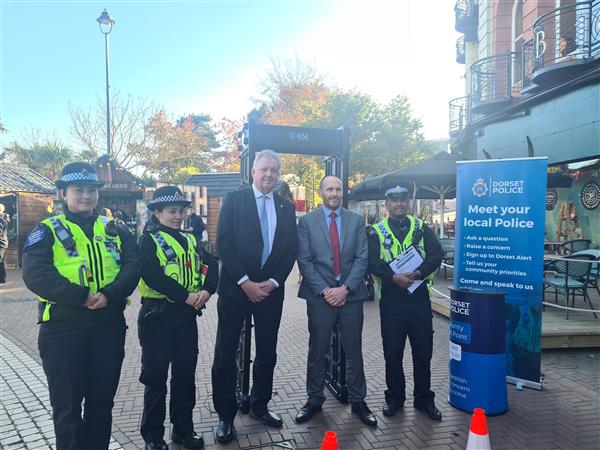|
||||
|
||||
|
|
||||
Sceptre is a week dedicated to tackling and raising awareness of knife crime. It is important that during this week, the work being carried out across Dorset to tackle this harmful crime is highlighted to the public and our key partners. However, I want you to know that while you may see more this week about the work Dorset Police and my team at the OPCC are doing, our focus is on this important issue all year round - and is relentless. Earlier this year, my team worked with officers and staff at Dorset Police’s Safer Schools and Communities Team to produce a series of hard-hitting videos on the impact of knife crime, to be shown in schools and educational settings. The four videos feature different people who have all experienced the tragic consequences and impact of knife crime; these are Sarah Robinson, the mother of Cameron Hamilton, Matt Baker, a consultant in emergency medicine at University Hospitals Dorset, a Dorset Police officer, and a youth mentor with child exploitation charity Escapeline, who was previously involved in county lines and experienced knife crime. These videos have been shown to young people throughout this week as part of the SSCT programme of education they are delivering in schools across the county. Today, I would like to introduce one of my OPCC team, who heads up a team dedicated to reducing violence in Dorset. Rachel Young, Head of Violence Reduction and Prevention is spearheading this area of work, collaborating with partners to ensure interventions and diversions, and identifying those most at risk so adequate safeguards are put in place. Over to Rachel to explain more. Although Dorset remains in the top ten safest places to live in the UK, we acknowledge that our communities are concerned about the prevalence of knife crime. In Dorset, incidents of knife crime remain low, but we’re not complacent about this – far from it. Nationally, the Home Office previously provided funding for 20 areas to pilot a Violence Reduction Unit (VRU) approach. A VRU brings together partner agencies including Local Authorities, Health, and Education sectors, to co-ordinate a commissioning of services which aim to prevent serious violence. This co-ordinated response is shaped by a needs assessment which clearly identifies local issues and gaps in provision. Dorset was not a funded VRU area, but the PCC has committed funding to lay the groundwork and build on the incredible progress made by our local community safety partnerships, as part of his commitment to tackling this issue as part of the Police and Crime Plan. According to research commissioned by the Home Office, there are two consistent drivers to serious violence – drugs and vulnerability. In September 2022 the Dorset Combatting Drugs Partnership Board was established, chaired by Dorset Police and Crime Commissioner, David Sidwick. This partnership approach to tackling drugs within Dorset has three key areas of work – enforcement, prevention and treatment and recovery - and targets the driver to serious violence related to drugs. The OPCC’s Violence Reduction and Prevention team, which I head up, are now focusing on vulnerability. We know through research related to Adverse Childhood Experiences (ACEs) that adversity during childhood can have significant impact on physical and mental health during adulthood but can also create a vulnerability that can be targeted for the purposes of criminal exploitation. The 10 identified ACEs are: - physical abuse - sexual abuse - psychological abuse - physical neglect - psychological neglect - witnessing domestic abuse - having a close family member who misused drugs or alcohol - having a close family member with mental health problems - having a close family member who served time in prison - parental separation or divorce on account of relationship breakdown Therefore, rather than waiting for a child to be targeted and exploited, our goal is to commission quality early intervention that can prevent these ACEs having a long-term negative impact on a child’s life. Early in the new year we will be starting a conversation with Dorset’s young people to understand serious violence from their perspective and experiences. Our aim is to listen to young people and create a feedback loop so they can see the impact of their voice. We want to co-create a plan with young people, for young people. This will run alongside a needs assessment which will bring together a number of data sources from both local services and national data sets. Getting behind the data will help us to better understand the local picture of serious violence and the local gaps in provision. Data and lived experience together give us the best possible guidance to commission services that make a positive impact on the lives of children and young people in Dorset. Thanks to Rachel for such a clear explanation of her and the team’s work, and what we hope to achieve. Safeguarding young people from exploitation and crime is crucial; the impact of early positive intervention cannot be underestimated. That’s why I have spent so long campaigning for a Violence Reduction Unit in Dorset – because we can see the results are very encouraging. Dorset is getting onto the front foot to ensure our residents are safe and can have confidence that we are committed to tackling this. I want to be clear; I want the benefits a VRU brings to ensure we stay a safe county. While Dorset does have a low rate of knife crime, there are too many young people picking up knives and that is why there is no room for complacency because lives can be changed in a heartbeat. David Sidwick Dorset Police and Crime Commissioner | ||||
Reply to this message | ||||
|
||||
|
|
|






